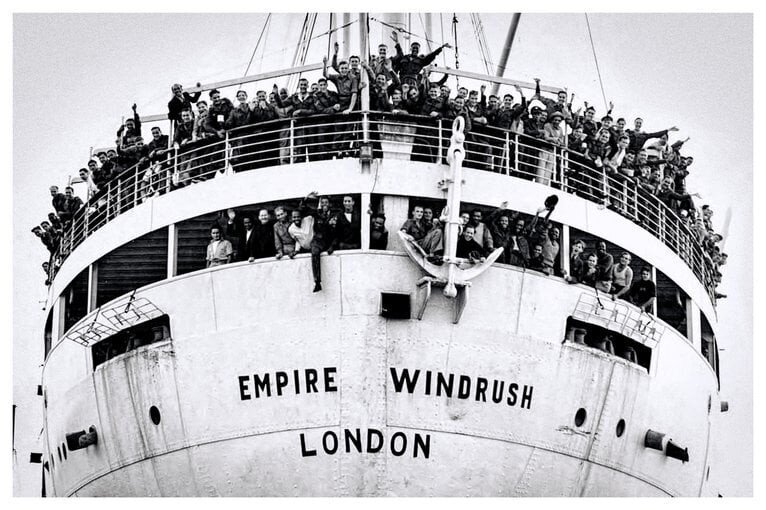
My name is Kolade Jegede, I am a Partner and Solicitor at S.A.J Legal. Having acquired an indefinite leave to remain status for a client under the Windrush Scheme, I will be assessing the general outline of the Windrush Scheme. First, it is essential to take a history guide to get a better understanding of why the Windrush Scheme was first introduced.
What is the Windrush Generation?
This week marked the 75th anniversary since the HMT Empire Windrush docked in Tilbury, Essex, on 22 June 1948, carrying passengers from the Caribbean to fill labour shortages in the UK. The term “Windrush Generation” used frequently describes the 492 passengers and others who arrived in the UK from Caribbean countries between 1948 and 1971. Many had also served to assist the British armed forces in Word War Two in accordance to BBC News.
What is the Windrush Scandal?
It was uncovered that many migrants of those belonging to the Windrush Generation did not hold an official status that could verify their permission to stay in the UK. This is also because, on top of failing to maintain records, the UK Home Office had not issued them the paperwork needed to confirm their status. Coupled with this, the landing cards belonging to Windrush migrants were destroyed in 2010, in accordance with BBC News.
According to information from the Migration Observatory at Oxford University up to 50,000 may not have registered. At the time of the Scandal, those who did not have any confirmation of status were categorised as illegal immigrants.
The problem came to public attention in April 2018, when it was actively raised by politicians, diplomats and campaigners that Caribbean immigrants were being deemed illegal immigrants, resulting in restriction of NHS treatment, loss of employment and in many unfortunate cases, detention and deportation of Caribbean immigrants, entitled to protection as Windrush Generation.
It is worth noting that although entitled “Windrush scandal” similar incidents of being unable to establish a UK status were occurring at the same time for those belonging to British colonies (and former British colonies) in South Asia and Africa. The Windrush Scheme, therefore, is not solely limited to Caribbean immigrants and extends to all Commonwealth citizens.
What factors led to the Windrush Scheme being introduced?
Once the public was fully aware of the scale of the scandal, there was an intense backlash against the Secretary of State for the Home Department at the time. Specifically, it was evident at the time that many immigrants that were entitled to be in the UK were being actively deported with many also experiencing mental health issues triggered by the treatment of the Home Office. Archives show about 400 long-term sick and mentally ill people were deported according to a BBC investigation.
In April 2018, the Prime Minister at the time, Theresa May apologised for the controversy and the treatment and a compensation scheme was established (this will be the focus of my next article). The inquiry that followed confirmed that the Windrush scandal was avoidable and foreseeable and the Home Office were heavily criticised.
The Windrush Scheme
Having set out the basis of the scheme, we will now have an overview of what the scheme is.
To meet the eligibility, the following must be met.
- You came to the UK from a Commonwealth country before 1973.
- Your parents came to the UK from a Commonwealth country before 1973.
- You came to the UK from any country before 31 December 1988 and are now settled here.
For those unaware if they are from a Commonwealth country, please do not hesitate to contact me, and I will confirm from the elaborated list whether your nationality appears.
We shall now have a summary of each of the categories individually.
1.You came to the UK from a Commonwealth country before 1973
The criteria required is that you are a Commonwealth citizen and you were settled in the UK before 1 January 1973. You can only meet this criterion if you have been living in the UK continuously. The Home Office will consider if the person applying is already British and by the same process, it will be the Home Office to determine if they were settled in the UK before 1973.
The applicant will have to meet the residence requirements for citizenship and the good character requirement. This is why there are different ranges of grants because those that do not will then be considered under the right to abode and then settlement. The applicant would not need to pass a Life in the UK test or any other English Language requirement.
For those that did not remain in the UK continuously, even though your status would have lapsed by absence from the UK, you may still be entitled to indefinite leave to remain.
2.Your parents came to the UK from a Commonwealth country before 1973
The criteria are that one of your parents is from a Commonwealth country, they were settled in the UK before 1 January 1973 and they have the right to abode (right to abode for those unaware of meaning is when you are allowed to live or work in the UK without any immigration restrictions). In addition to this criterion, you must have either been born in the UK or you came to live in the UK before turning 18. Those eligible can apply for British citizenship or a document confirming they have indefinite leave to remain.
Similar to criteria under (1) no Life in the UK or English Language would be required but the applicant will still need to meet the residence requirements for British citizenship.
Should you wish to acquire further information about residence requirements and British citizenship, please do not hesitate to contact me to go over this.
3.You came to the UK from any country before 31 December 1988 and are now settled here.
You can apply for a document to prove you can live and work in the UK if you came to live in the UK before 31 December 1988 and are now settled here. You can be of any nationality.
Key Points to Consider
It is worth noting that a supporting document is key to meeting the criteria. Many may not be able to provide proof but a good solicitor should be able to advise you how to address this appropriately. All applications under Windrush are free. A further note is that you do not have to be residing in the UK to apply, there will be many people already suffering the consequences of being deported by the Windrush Scandal, who can now still apply for recognition of status. However, given that the person is now outside the UK, any status granted will be a Returning Resident visa, they cannot be eligible for British citizenship, until they meet the residence requirements which will take several years in light of the fact that they would have just entered the UK. They can also decide to instead be granted a 10-year multiple entry visit visa if they do not actually want to return to the UK but to regularly visit the country.
Conclusion
It is regretful that a generation that has assisted in boosting the attraction of Britain can experience such injustice. The Government at the height of the Windrush Scandal confirmed that more than 160 members of the Windrush generation may have been wrongly detained or deported (according to the independent newspaper). The introduction of the Scheme may not satisfy those that have suffered a substantial amount of hardship, and financial and emotional turmoil.
However, the Government have provided a scheme that at the least could provide many with the opportunity to acquire the right that they were always entitled to have.
As for the Windrush Generation and the anniversary of this week, they will always have a place in history having played a vital role in shaping today’s Britain.










